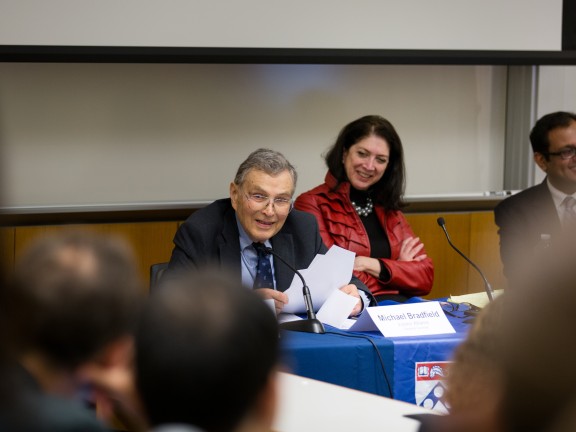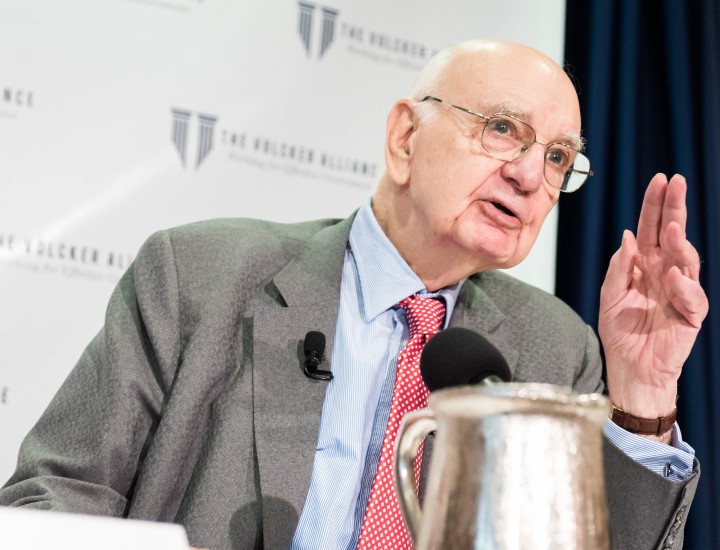Volcker on Bradfield: A Life in Public Service

This op-ed was mentioned in Politico's Morning Money on August 8.
Washington D.C. is in political turmoil. Congress is in partisan gridlock. Major agencies have leadership vacuums, with policy uncertainties. Trust in government is at a low point.
But government – effective government, respected government – is not something we can do without, turn on and off. Whatever policies are decided by elected officials, we count on a cadre of skilled, professional, committed men and women to steer the ship of state, year in and year out, in stormy weather or foul.
One long serving member of that crew died July 26 at age 83, a few years out of public office but dedicated to his end to the cause of good government.
Michael Bradfield was a Columbia University trained lawyer and student of international affairs. He spent a part of his life in private practice, for a time as a senior partner of the distinguished Jones Day firm. But his heart was in public service.
It started more than 50 years ago, as Treasury Assistant General Counsel. It extended over time to General Counsel of the Federal Reserve Board in the 1980s and later the FDIC. In those capacities, he was called upon to deal with large challenges, some of national significance. When President Nixon decided to end the gold-dollar link and suddenly impose an import surcharge, it was Michael Bradfield, who was called on short notice to Camp David during the weekend of August 15, 1971 to assure the necessary legal framework was in place.
A decade later, in the midst of the 1980s Latin American debt crisis, it was Michael Bradfield, who worked with the Federal Reserve Board, the Treasury, and the IMF, to provide the framework for the needed assistance. Later, in the early 1990s, the savings and loan and banking crises led to important legislative negotiations. In yet another decade, the “Great Financial Crisis” called him out of retirement to lead the FDIC legal team.
I knew Michael Bradfield. I leaned on Michael Bradfield when I was in office both as Treasury Undersecretary for Monetary Affairs and as Fed Chair. He crafted the legal defense of the Federal Reserve’s independence in a critical court case. I later called upon him to take much of the responsibility for adjudicating the Swiss Bank-Jewish financial settlement for victims of the Holocaust. He subsequently joined a small group establishing a new non-profit organization – now known as the Volcker Alliance – “working for effective government”. Think of that these days as a challenge worth doing – a challenge that for decades was a big part of Mike Bradfield’s life.
I visited with him and his family as he was failing. One of his sons asked a simple question: “which of the positions over your long life has given you the most satisfaction?” Mike thought a bit, and then responded: “I guess it was at the Federal Reserve. But the fact is I found a lot of satisfaction in all my public service. I would have been willing to pay to take those jobs.”
How much of that spirit, that respect for service in government in all its forms and settings is alive today? The doubts, the questioning, the erosion of trust is all too evident.
But I also know there are dedicated civil servants working today to maintain effective government under difficult circumstances. Every day I am reminded that there are young Mike Bradfields, willing and able to serve. But, as a nation, are we doing enough to support those efforts? Are our universities providing those with the urge to serve with relevant education? Do our governments at all levels do enough to recruit and train the best? Are the President and the Congress willing to respect the importance of well-qualified non-partisan professionals to carry out day after day the essential work of government?
Mike Bradfield was not alone – a skilled professional, facing changing circumstances, working with different agencies to maintain and advance the public interest in effective government. But the fact is we need to attract and keep more men and women of that caliber in civil service.
Quite specifically, a small group of Senators and Congressmen have begun working across their respective aisles to review the existing civil service system. Clearly reforms are needed while maintaining the strong non-partisan traditions. Those efforts urgently need support.
It’s not a question of “big government” or “small government”. Alexander Hamilton made the point at the very beginning of our constitutional system: “The true test of good government is its aptitude and tendency to produce a good administration”. Michael Bradfield did his part in meeting that test. As a nation, we have work to do.


